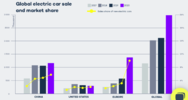Value Collector
Have courage, and be kind.
- Joined
- 13 January 2014
- Posts
- 12,265
- Reactions
- 8,527
Or just pricing, petrol stations used to do cheaper fuel on tuesdays to avoid the pay day rush, no reason electricity companies can’t do the same.Legislative requirement ?
there is actually one company that already offers customers free power between 12pm-2pm on Saturday and Sunday, to combat solar glut.




